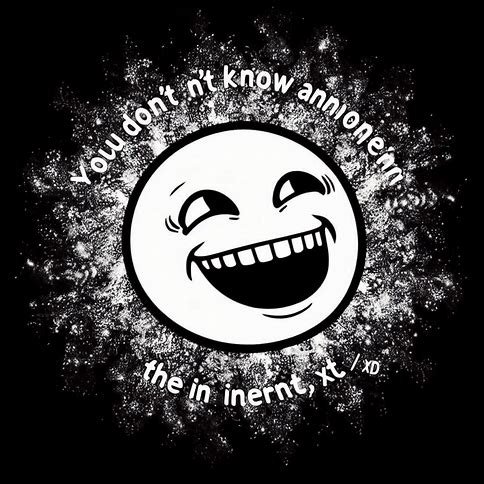
I imagine that at some point you have heard about internet rule 34 or root 34, r34 in short, it claims that if something exists, there is a porn version of it, okay that's fine, not everyone has to be gallery artists. This rule is followed by rule 35, like an appendix that adds that if the porn version of what you are looking for does not exist, well, it is because it is being created, but rest assured that at some point it will be made, as you can appreciate both comments are very accurate. The point here is that if you took the time to search and read the rest of these rules omitting the absurd ones, you will notice that there is much truth in some of them just as it happens in real life, there are certain guidelines that are not legislated or listed in many behavior and ethics manuals and yet they remain good codes to respect. Perhaps your friend Bryan knows what I am talking about, but just in case I will put here a more understandable example.
1- Do not criticize a popular taste or at least find the right moment and the right people with whom you can do it. There must be something good in what many people like even if that taste cannot be well explained.
2- Opinions against the masses tend to be hated and mocked, if you are not able to enjoy what others like, it is wiser to ignore it.
(I take this opportunity to say that: breaking bad is overrated and very zzz). Continuing with the idea of laws, most laws arise through customs, what is usual. It occurs more frequently in people's behavior, that is what is expected of them, like when someone says 12 + 1 I know it is childish. This phenomenon also occurs on the internet, there are common behaviors and reactions among most users, the reason why this dog was invented.

After this long introduction and hoping you're not asleep, I would like to share one of the internet laws that, in my opinion, is one of the most important. You can never, truly never, know when someone is joking on the internet.
Going back to my opinion that no one asked for from Breaking Bad, then I ask: Did I say it seriously, or was it a joke? Better known as Poe's Law (this will help us understand the matter a bit better), states that: without a textual emoji or any other element that provides context on the internet, there is no way to know if something is serious or not. It's all about context, and that's precisely what is least abundant, meaning it allows you to differentiate between the joke made by your friend and a potential xenophobic, racist, misogynistic, megalomaniac, and potential murderer. The detail in this is that you know your friend, most of the time, you never know, but you know the intention behind that comment, an intention that serves as context and therefore you know I'm not serious, the opposite situation can occur in any discussion on social media about a random topic, for example, how can they compare Bad Bunny to Michael Jackson, reggaeton is the worst thing that has happened to humanity, and there you go wanting to see them riled up as you comment calling him the new king of pop, then as the other person has no clue who you are, they assess your personality and intelligence based on that comment, getting more and more delusional every day. But you can't blame them because they lack context, and it's not something that happens exclusively with comments on any post. This can happen with photos, videos, articles, and even profiles or accounts. In fact, these are the worst because you're not going to try to fill in the character profile sheet and the psychological profile of someone due to the missing context elements; instead, it will be the person themselves who decides which elements to give you and which not to.

That's what I want you to believe when you see my profile—they design the experience for you. This topic is closely related to my next post, "The best method to destroy an idea." Every day you see those people arguing and exposing their opinions on many things, and you won't always be able to tell if what they're saying is real or somewhat serious, which is why it's very difficult to know when something constitutes black propaganda. But you also can't doubt everything, so you retreat to your prejudices and you know they take advantage of that. But I'm getting off track, and the best part is still to come, so pay close attention. There is a technique for classifying a post based on the amount of context it possesses, better known as the irony scales, which allow us to recognize how much truth there is in a post. Let's start with the lowest degree.
Level 0 - That is easily identifiable sincerity, it is what is said to be, let's take for example the Tweety postcards that your aunt sends you on Facebook, the weather updates, the cartoons or comic strips, they do not pretend to communicate anything beyond what they present. Level 1 - Sarcasm or pre-irony, as the word itself indicates, refers to those posts where the falseness of what is stated is recognized, there is no effort to conceal what is said because that is the intention, to convey the opposite. Level 2 - Irony, where you find amusing what you hate, like working in a library and not being able to read. To land with an example from the internet, we have the user who advocates for freedom of expression on social media, but does not tolerate if someone tells them otherwise.
Level 3 - Post-irony, rather, if I did not know you, I would believe what you say and this is where the problem begins, although previously we may also have difficulties recognizing sarcasm and irony, generally, the majority of people tend to grasp the idea as they get the necessary information to understand what the message communicates and this often happens on YouTube where snippets of videos taken out of context go viral, especially if they are related to politics. Finally, we have level 4 - Meta-irony, where all opinions are valid because it cannot be determined what was really meant or what the intention was, frequently, the content related to the subject stands on its own as it totally lacks elements that provide context, for example, I still can't decipher Kanye West to this day which leads me to the next point. The scale of irony applied individually works like the image of the 6 and 9 painted on the ground, each person can classify something as ironic or meta-ironic depending on how much you know about what is being posted, but only the author of that post is sure of what it means. However, beyond the certainty of knowing what a person meant or the intention behind a post, the irony scale only reminds us that on the internet we cannot be 100% sure that something is what it claims to be, behaves as we see it does, and its intention is what it communicates.
Conclusion:
I may doubt your comments, but I will never doubt that these are topics that no one cares about.
source
Google- dog imagen.
AI- bing.
Congratulations @ciaran62! You have completed the following achievement on the Hive blockchain And have been rewarded with New badge(s)
Your next target is to reach 20 posts.
You can view your badges on your board and compare yourself to others in the Ranking
If you no longer want to receive notifications, reply to this comment with the word
STOPCheck out our last posts: